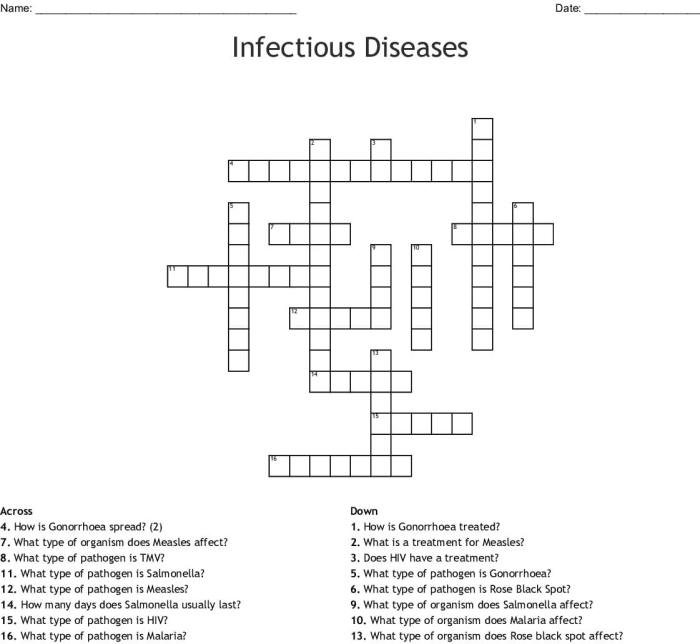Welcome to the realm of infectious diseases crossword puzzle answer key, where curiosity and knowledge converge. This guide unveils the intricacies of infectious diseases, empowering you to conquer crossword puzzles with precision and expand your understanding of this captivating field.
Embark on a journey through the diverse types of infectious diseases, unraveling their unique characteristics and the methodologies employed to identify them. Discover the arsenal of treatment options and preventive measures that safeguard global health, and delve into the profound impact of infectious diseases on societies throughout history.
Definition of Infectious Diseases
Infectious diseases are diseases caused by pathogenic microorganisms, such as bacteria, viruses, fungi, and parasites. These microorganisms can be transmitted from one person to another through various means, including direct contact, airborne transmission, or contact with contaminated surfaces.
Types of Infectious Diseases, Infectious diseases crossword puzzle answer key
- Bacterial infections:Caused by bacteria, such as pneumonia, tuberculosis, and urinary tract infections.
- Viral infections:Caused by viruses, such as influenza, measles, and HIV.
- Fungal infections:Caused by fungi, such as athlete’s foot, ringworm, and candidiasis.
- Parasitic infections:Caused by parasites, such as malaria, hookworm, and tapeworms.
Crossword Puzzle Answer Key
Common infectious diseases that may appear in crossword puzzles include:
- AIDS: Acquired immunodeficiency syndrome, caused by HIV.
- BOTULISM: A serious paralytic illness caused by a toxin produced by the bacterium Clostridium botulinum.
- CHOLERA: An acute diarrheal disease caused by the bacterium Vibrio cholerae.
- DENGUE: A mosquito-borne viral infection that causes fever, headaches, and muscle pain.
- EBOLA: A severe viral infection that causes fever, bleeding, and organ failure.
These diseases are included in crossword puzzles due to their prevalence, historical significance, or unique symptoms.
Methods of Identifying Infectious Diseases
Various methods are used to identify infectious diseases:
- Microscopy:Using a microscope to examine specimens for the presence of microorganisms.
- Culture:Growing microorganisms in a laboratory setting to identify their characteristics.
- Serology:Testing for the presence of antibodies or antigens in the blood.
- Molecular diagnostics:Using techniques such as PCR to detect specific genetic material of microorganisms.
Each method has its advantages and disadvantages, and the choice of method depends on the suspected pathogen and the availability of resources.
Treatment and Prevention of Infectious Diseases
Treatment options for infectious diseases include:
- Antibiotics:Drugs that kill or inhibit the growth of bacteria.
- Antivirals:Drugs that inhibit the replication of viruses.
- Antifungals:Drugs that kill or inhibit the growth of fungi.
- Antiparasitics:Drugs that kill or inhibit the growth of parasites.
Prevention is crucial in controlling the spread of infectious diseases:
- Vaccination:Immunizing individuals against specific pathogens.
- Hygiene:Practicing good hygiene, such as handwashing and proper disposal of waste.
- Sanitation:Ensuring access to clean water and sanitation facilities.
Impact of Infectious Diseases

Infectious diseases have had a profound impact on society throughout history:
- Historical pandemics:The Black Death (bubonic plague) killed an estimated 25-50 million people in the 14th century.
- Economic burden:Infectious diseases can lead to lost productivity, healthcare costs, and reduced economic growth.
- Social consequences:Infectious diseases can cause stigma, discrimination, and social isolation.
Emerging Infectious Diseases
Emerging infectious diseases are new or previously unknown diseases that have recently appeared in humans.
- Factors contributing to emergence:Globalization, climate change, and changes in land use.
- Significance:Emerging infectious diseases can pose significant threats to public health and economic stability.
Crossword Puzzle Strategies: Infectious Diseases Crossword Puzzle Answer Key
Solving crossword puzzles related to infectious diseases requires:
- Knowledge of common infectious diseases and their symptoms.
- Understanding of wordplay, abbreviations, and other techniques used in crossword puzzles.
- Patience and persistence.
Educational Value of Crossword Puzzles
Crossword puzzles can be used as an educational tool to enhance knowledge about infectious diseases:
- Cognitive benefits:Solving crossword puzzles improves memory, problem-solving skills, and vocabulary.
- Disease awareness:Crossword puzzles can introduce individuals to different infectious diseases and their characteristics.
- Engagement and motivation:Crossword puzzles provide an engaging and motivating way to learn about infectious diseases.
FAQ
What is the most common type of infectious disease?
Respiratory infections, such as the common cold and influenza, are the most prevalent type of infectious disease.
How can I prevent the spread of infectious diseases?
Regular handwashing, covering coughs and sneezes, and maintaining a clean environment are effective ways to prevent the spread of infectious diseases.